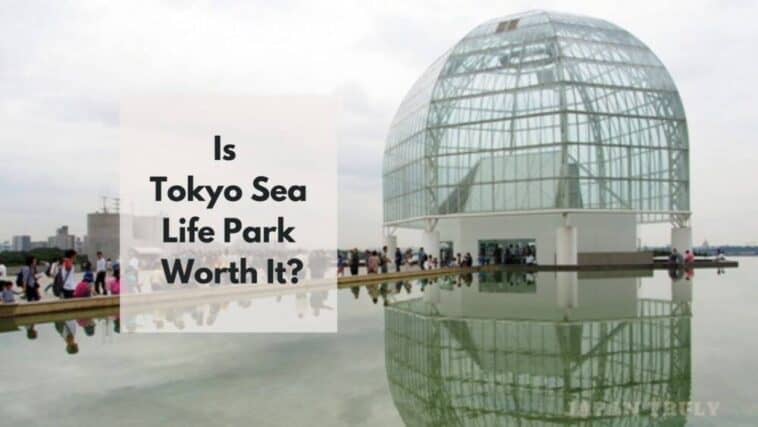Is Tokyo Sea Life Park worth it? Find out in this comprehensive guide, which covers everything from the park’s exhibits and animals to its admission price and how to get there.
Tokyo Sea Life Park is one of the largest aquariums in Japan, with over 85,000 animals from over 940 different species. The park is home to a variety of exhibits, including a coral reef tank, a deep sea exhibit, and a penguin exhibit.
Tokyo Sea Life Park is a popular tourist destination, but is it worth the visit? In this article, we will take a closer look at the park and its attractions, as well as the admission price and how to get there.
Page Contents
Is Tokyo Sea Life Park Worth It?
Tokyo Sea Life Park, nestled within Kasai Rinkai Park, offers a captivating underwater journey that makes it totally worth it! Its centerpiece, the Dome, showcases diverse marine life, including sharks, rays, and sea turtles.

Educational exhibits promote ocean conservation. Special exhibitions and interactive activities enrich the experience, making it ideal for families and those interested in marine biology. Conveniently accessible from central Tokyo, it’s a worthwhile.
What to Do in Tokyo Sea Life Park
When you step into Tokyo Sea Life Park, you’ll find a wide range of activities and attractions that cater to visitors of all ages.
Whether you’re a marine enthusiast, a family with kids, or just curious about underwater life, there are plenty of things to do and explore within the park:
1. Marvel at the Main Tank:
- Start your visit by gazing into the breathtaking 2,200-ton main tank. This massive tank houses an impressive collection of marine life, including sharks, rays, and giant tuna. The sheer scale of this exhibit is awe-inspiring, and you can spend a significant amount of time just observing the marine creatures gracefully gliding through the water.
2. Interactive Exhibits:
- Tokyo Sea Life Park features a variety of interactive exhibits that provide a hands-on learning experience. You can touch some of the smaller marine animals, such as sea stars and sea cucumbers, at designated touch tanks. These encounters are not only fun but also educational, allowing you to get up close and personal with marine life.
3. Attend Feeding Demonstrations:
- Check the schedule for feeding demonstrations at the park. It’s a fascinating opportunity to witness how the staff cares for and nourishes the animals. The narrated demonstrations offer insights into the dietary habits and behaviors of different species, making it an educational and entertaining experience.
4. Discover Unique Habitats:
- Tokyo Sea Life Park features a variety of themed zones representing different marine habitats. Explore the “Tokyo Bay Zone” to learn about the local aquatic ecosystems or venture into the “Izu Islands Zone” to encounter species from the remote Izu Islands. Each zone offers a distinct and informative experience.
5. Visit the Penguin Pool:
- One of the most beloved attractions within the park is the penguin pool. Tokyo Sea Life Park is home to a colony of playful penguins, and watching their antics can be both amusing and heartwarming. Be sure to catch a feeding session to see these charismatic birds in action.
6. Engage with Educational Displays:
- Throughout the park, you’ll find informative displays and exhibits that provide insights into marine biology, conservation efforts, and the challenges faced by underwater ecosystems. Take your time to read and learn more about the importance of preserving our oceans.
7. Enjoy Scenic Views:
- Don’t forget to take in the beautiful views of Tokyo Bay from various vantage points within the park. The combination of aquatic wonders and serene surroundings makes for a picturesque visit. Consider bringing a camera to capture the memorable moments.
8. Explore Kasai Rinkai Park:
- After you’ve explored Tokyo Sea Life Park, take some time to explore the larger Kasai Rinkai Park. You can have a picnic, go for a walk along the bay, or relax amidst the natural beauty. It’s an ideal spot to unwind and reflect on your aquatic adventure.
9. Gift Shop and Cafeteria:
- Before leaving, stop by the gift shop to pick up marine-themed souvenirs and visit the cafeteria for refreshments. It’s a great way to wrap up your visit and take home a memento of your day at the park.
In summary, Tokyo Sea Life Park offers a wide range of activities and attractions that make it a captivating and educational destination.
Whether you’re interested in marine life, seeking family-friendly fun, or simply looking for a unique experience in Tokyo, the park has something for everyone.
From marveling at majestic marine creatures to engaging with interactive exhibits, your visit to Tokyo Sea Life Park is sure to be a memorable and enriching adventure.
- Related: Is Tokyo Imperial Palace Worth It?
How big is Tokyo Sea Life Park?
Tokyo Sea Life Park has a land area of 15,799 square meters (170,000 square feet). This makes it one of the largest aquariums in Japan in terms of land area.
The park has over 85,000 animals from over 940 different species. The largest tank in the park, called the “Voyagers of the Sea,” has a volume of 2,200,000 liters (581,000 US gallons).
This tank is home to a variety of sea creatures, including bluefin tuna, hammerhead sharks, and flapnose rays.
Tokyo Sea Life Park is a popular tourist destination, and it is estimated that over 1 million people visit the park each year.
- Related: Is Tokyo DisneySea Worth It?
What’s the entrance fee at Tokyo sea life park?
The entrance fee at Tokyo Sea Life Park is as follows:
- Adults (13 years old and over): 700 yen
- Children (12 years old and under): Free
There are also discounts available for groups of 20 or more people, and for people with disabilities.
The aquarium is also free to enter on certain days of the year, such as October 1 (Tokyo Citizens’ Day), May 4 (Greenery Day), and October 10 (the aquarium’s anniversary day).
How much time to spend at tokyo sea life park?
Most visitors spend about 2-3 hours exploring Tokyo Sea Life Park. This is enough time to see all of the main exhibits and learn about the different sea creatures that live in the aquarium.
However, if you are interested in learning more about the animals or participating in any of the special programs that the aquarium offers, you may want to spend more time there. For example, the aquarium offers daily feeding talks and behind-the-scenes tours.
Here is a suggested itinerary for a 2-3 hour visit to Tokyo Sea Life Park:
- 10:00 AM: Arrive at the aquarium and purchase your tickets.
- 10:30 AM: Start by visiting the “Voyagers of the Sea” tank, the largest tank in the aquarium.
- 11:30 AM: Visit the “Deep Sea” exhibit to see some of the strange and wonderful creatures that live in the deep ocean.
- 12:30 PM: Have lunch at the aquarium’s restaurant or bring your own picnic to enjoy in the park.
- 1:30 PM: Visit the “Penguin Paradise” exhibit to see the penguins being fed.
- 2:30 PM: Visit the “Mangrove Forest” exhibit to learn about the importance of mangrove ecosystems.
- 3:30 PM: Depart from the aquarium.
If you have more time, you can also check out some of the other exhibits, such as the “Touch Pool” where you can touch and interact with some of the animals, or the “Ocean Theater” where you can watch educational films about marine life.
In conclusion, Tokyo Sea Life Park is undoubtedly worth a visit for anyone interested in marine life, conservation, or simply seeking a unique and educational experience in Tokyo.
The park’s stunning exhibits, educational initiatives, engaging activities, and commitment to conservation make it a valuable destination.
Whether you’re a family looking for an educational outing or a traveler seeking a break from Tokyo’s urban hustle, Tokyo Sea Life Park promises a day filled with wonder and insight into the ocean’s mysteries.
So, next time you find yourself in Tokyo, consider venturing to this aquatic paradise – you won’t be disappointed!
My writing focuses on the various aspects of Japanese lifestyle, from traditional tea ceremonies and flower arrangement to modern fashion trends and pop culture. Through my articles, I aim to share my passion for Japan and provide readers with a glimpse into the rich and diverse world of Japanese culture.
I believe that the key to understanding Japanese lifestyle is to appreciate the balance between tradition and innovation. While Japan has a rich cultural heritage that dates back centuries, it is also a country that is constantly evolving and embracing new ideas and technologies.
Whether you’re interested in learning about the latest fashion trends in Tokyo, or want to explore the ancient art of calligraphy, my writing will take you on a journey through the many facets of Japanese lifestyle. So join me as we explore the beauty and complexity of this fascinating culture together!





